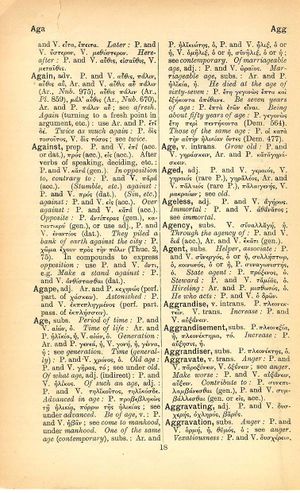age: Difference between revisions
ἐπάμεροι· τί δέ τις; τί δ' οὔ τις; σκιᾶς ὄναρ ἄνθρωπος → Neverlasting: What is a somebody? What is a nobody? You are a dream of a shadow | Creatures of a day. What is a someone, what is a no one? Man is the dream of a shade.
m (Text replacement - "}}]]" to "}}]]") |
(1) |
||
| Line 47: | Line 47: | ||
{{Georges | {{Georges | ||
|georg=age, s. [[ago]] a.E.. | |georg=age, s. [[ago]] a.E.. | ||
}} | |||
{{LaEn | |||
|lnetxt=age INTERJ :: come!, go to!, well!, all right!; let come | |||
}} | }} | ||
Revision as of 22:35, 27 February 2019
English > Greek (Woodhouse)
subs.
Period of time: P. and V. αἰών, ὁ.
Time of life: Ar. and P. ἡλικία, ἡ, V. αἰών, ὁ.
Generation: Ar. and P. γενεά, ἡ, V. γονή, ἡ, γέννα, ἡ; see generation.
Time (generally): P. and V. χρόνος, ὁ.
Old age: P. and V. γῆρας, τό; see under old.
Of what age, adj. (indirect): P. and V. ἡλίκος.
Of such an age, adj.: P. and V. τηλικοῦτος, τηλικόσδε.
Advanced in age: P. προβεβληκὼς τῇ ἡλικίᾳ, πόρρω τῆς ἡλικίας; see under advanced.
Be of age, v.: P. and V. ἡβᾶν; see come to manhood, under manhood.
One of the same age (contemporary), subs.: Ar. and P. ἡλικιώτης, ὁ, P. and V. ἧλιξ, ὁ or ἡ, V. ὁμῆλιξ, ὁ or ἡ, συνῆλιξ, ὁ or ἡ; see contemporary.
Of marriageable age, adj.: P. and V. ὡραῖος.
Marriageable age, subs.: Ar. and P. ἡλικία, ἡ.
He died at the age of sixty-seven: P. ἔτη γεγονὼς ἕπτα καὶ ἐξήκοντα ἀπέθανε.
Be seven years of age: P. ἑπτὰ ἐτῶν εἶναι.
Being about fifty years of age: P. γεγονὼς ἔτη περὶ πεντήκοντα (Dem. 564).
Those of the same age: P. οἱ κατὰ τὴν αὐτὴν ἡλικίαν ὄντες (Dem. 477).
v. intrans.
Grow old: P. and V. γηράσκειν, Ar. and P. καταγηράσκειν.
Latin > English (Lewis & Short)
ăge: and ăgĕdum, v. ago, II. 12.
Latin > French (Gaffiot 2016)
ăgĕ,⁹ ăgĭtĕ, ăgĕdum, ăgĭtĕdum, (ago), anciens impératifs devenus de pures interjections : eh bien ! allons ! or çà ! [les formes du sing. age, agedum sont employées même quand elles s’adressent à une pluralité : Pl. Mil. 928 ; St. 221 ; As. 828 ; Cic. n’emploie jamais agite ] || [avec impér.] age vero, responde Cic. Cæc. 48, allons, voyons réponds ; age, esto Cic. Att. 9, 9, 3, eh bien, soit ; age nunc comparate... Cic. Mil. 55, voyons maintenant, comparez... || [avec subj.] age nunc consideremus Cic. Amer. 93, eh bien donc, examinons maintenant ; age, age, exponamus Cic. Fin. 5, 8, allons ! allons ! (soit) exposons... || [avec interrog.] age porro, tu cur imperasti ? Cic. Verr. 2, 5, 56, et maintenant voyons, toi, pourquoi as-tu commandé ? age porro, custodiri ducem placuit ; quæ sunt istæ custodiæ ? Cic. Verr. 2, 5, 68, soit, continuons : il a décidé de garder ce chef en prison ; or quelle est-elle, cette prison ? || [avec ind.] age, ut... omittamus, possum nominare... Cic. CM 24, hé ! sans parler de..., je puis nommer... ; nunc age, expediam Lucr. 2, 62 ; Virg. G. 4, 149, eh bien ! maintenant, j’expliquerai... || [ellipse du v.] « quin conscendimus equos ? » « age sane » omnes Liv. 1, 57, 7, « que ne montons-nous à cheval ? » « allons, soit ! » s’écrièrent-ils tous.
Latin > German (Georges)
age, s. ago a.E..
Latin > English
age INTERJ :: come!, go to!, well!, all right!; let come

